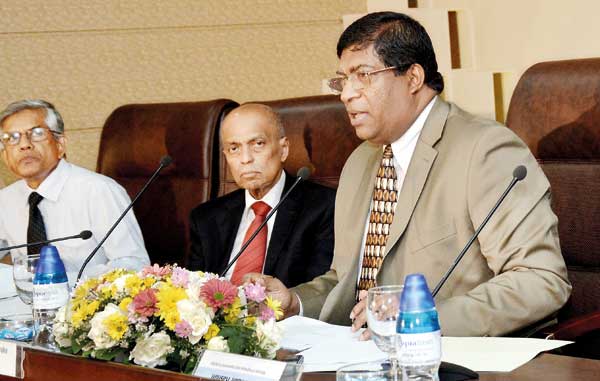Reply To:
Name - Reply Comment

By Chandeepa Wettasinghe
The second Doing Business Forum was held yesterday, during which, in addition to finding solutions for problems faced by the private sector, the Finance Minister reiterated the need for state institutions to have a public relations section to make the government more business-friendly.
The forum was held to facilitate a dialogue between the government agencies and the private sector.
“These things (problems) can be taken on. They don’t necessarily need to come to chairmen themselves. The next meeting would be on the 16th of July. I want to see every institution having a public relations section, and mentioning them and marketing them up,” Ravi Karunanayake said.
He had asked government departments to set up a public relations section during the first ‘Doing Business Forum’ held last month; a request which appears to have been ignored.
“There must be a more user-friendly system in the public service,” he stressed.
Karunanayake also said that all unsolicited proposals for government projects will be converted into tender processes.
Meanwhile, in response to an investors’ request to reconsider the reopening of a closed down garment factory, Karunanayake said that 35 garment factories which had been shut down are being evaluated for reopening.
These garment factories were forced to discontinue their operations as Sri Lanka lost the GSP Plus concessionary tariff scheme a few years back. The new government says it has initiated a programme to regain GSP Plus. The minister promised to take into consideration the various requests and recommendations proposed by the business community. Guardian Fund Management Limited CEO Ruvini Fernando requested the government to relax the exchange controls placed on out flowing investments in order to maximize returns.“A Gazette notification in 2011 said that listed and unlisted companies could only invest a certain amount in instruments rated higher than the Sri Lankan sovereign. There are very limited opportunities and they are low risk. There are other instruments that can be invested in,” she said.
Overseas Realty (Ceylon) PLC CEO Pravir Samarasinghe noted that property tax for commercial properties were exorbitant compared to other developing countries such as Pakistan and Bangladesh, as well as more advanced countries such as Malaysia and Singapore; all of which have a tax rate of 10 percent.
He said that the high tax rate would lead to an aversion of commercial building construction due to a high period of return on investment.
“Don’t you think it’s too high? Talk to Pravir, get his ideas and submit a white paper,” Karunanayake advised the Inland Revenue Department. Ceylon Tobacco Company Director Stephan Matthiesen requested the government to place cigarettes in the negative lists of free trade agreements. The move would ensure greater profits for local tobacco manufacturers and higher tax revenue for the government.
“India and China are going to flood our markets. If you place restrictions, the local industry will be protected and the government can get higher taxes from higher prices cigarettes,” he said. Siddhalepa Managing Director Asoka Hettigoda highlighted that Ayurvedic medicine manufacturers were not exempted from VAT and other duties to which Western medicine manufacturers are not liable, while certain local governments have been taxing factory equipment unnecessarily, leading to closure of factories.
Karunanayake meanwhile said that easier access to Non-Residential Foreign Currency (NRFC) accounts will be considered, while subsidies will be provided to local construction companies engaged in the Nothern Expressway project.